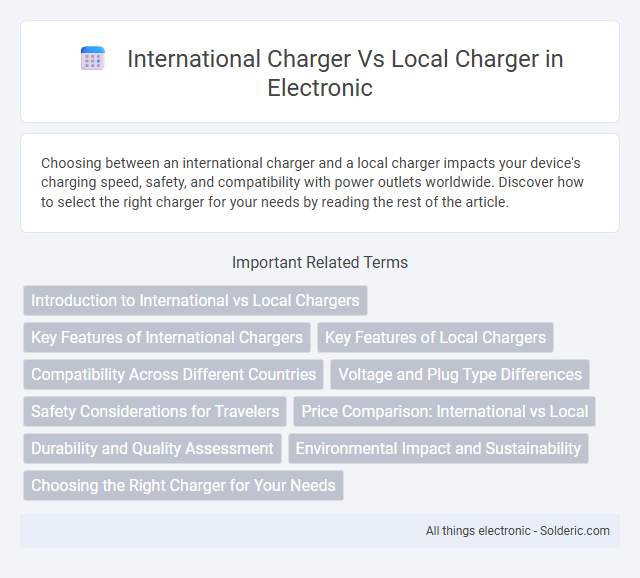Choosing between an international charger and a local charger impacts your device's charging speed, safety, and compatibility with power outlets worldwide. Discover how to select the right charger for your needs by reading the rest of the article.
Comparison Table
| Feature | International Charger | Local Charger |
|---|---|---|
| Voltage Compatibility | Supports 100-240V, suitable for multiple countries | Designed for local voltage (e.g., 110V or 220V) |
| Plug Type | Multiple plug adapters or universal plug | Single plug type specific to local region |
| Charging Speed | Varies depending on charger specifications | Optimized for local power standards, generally stable |
| Portability | Compact and portable for travel | Usually bulkier, less travel-friendly |
| Price | Higher due to additional features and compatibility | Generally lower, optimized for local use |
| Safety Features | Built-in surge protection and voltage regulation | Standard safety compliant with local regulations |
| Use Case | Ideal for frequent travelers and international use | Best for daily use within a single country |
Introduction to International vs Local Chargers
International chargers offer versatility by supporting multiple voltage standards (100-240V) and plug types, making them ideal for travelers navigating diverse electrical systems worldwide. Local chargers are designed specifically for the voltage and plug specifications of a single country, ensuring optimal performance and safety within that region. Understanding the compatibility and plug design differences between international and local chargers is crucial for efficient device charging and preventing electrical damage.
Key Features of International Chargers
International chargers feature universal voltage compatibility, supporting 100-240V, which allows seamless use across different countries without the need for voltage converters. Multiple plug adapters included with international chargers enable connection to diverse power outlets worldwide, enhancing convenience for travelers. Fast charging technology and built-in safety protections, such as over-current and short-circuit safeguards, ensure efficient and secure device charging on a global scale.
Key Features of Local Chargers
Local chargers are specifically designed to match the electrical standards, voltage, and plug types of the region, ensuring optimal charging efficiency and safety. They often support faster charging speeds aligned with local power infrastructure and include built-in protections against common regional power surges or fluctuations. Compatibility with local devices and adherence to regional certification standards are key features distinguishing local chargers from international models.
Compatibility Across Different Countries
International chargers offer broad compatibility with voltage ranges from 100V to 240V and various plug types, ensuring seamless use across multiple countries without the need for additional adapters. Local chargers typically support a specific voltage and plug standard, limiting their functionality to a single region or country. Choosing an international charger enhances convenience and safety by automatically adapting to different electrical systems worldwide.
Voltage and Plug Type Differences
International chargers often support a wide voltage range, typically 100-240V, making them compatible with varying electrical systems worldwide. Local chargers usually operate within a fixed voltage range specific to the country, such as 110-120V in the US or 220-240V in Europe. Plug type differences include variations like Type A and B plugs in North America versus Type C, E, or F plugs commonly used in European countries, requiring adapters for proper connectivity.
Safety Considerations for Travelers
International chargers often feature built-in voltage regulation and multi-plug compatibility, reducing the risk of electrical damage or fire hazards when used abroad. Local chargers may lack universal voltage support, increasing the chance of overheating or device failure if plugged into incompatible outlets. Travelers should prioritize chargers with safety certifications such as UL or CE and verify voltage compatibility to ensure device protection and personal safety.
Price Comparison: International vs Local
International chargers often come at a higher price due to import taxes, shipping fees, and brand exclusivity compared to local chargers that are typically more affordable and readily available. Local chargers benefit from lower distribution costs and compatibility with regional power standards, making them cost-effective options for your everyday charging needs. Choosing between international and local chargers depends on balancing price with quality, warranty support, and specific device compatibility.
Durability and Quality Assessment
International chargers typically undergo rigorous quality and durability testing to meet global safety standards such as IEC and UL, ensuring reliable performance across various voltage inputs. Local chargers may vary widely in build quality and material robustness, often influenced by regional manufacturing standards and cost factors. Assessing durability involves examining factors like heat dissipation, surge protection, and connector integrity, where international chargers usually offer superior longevity and safer operation.
Environmental Impact and Sustainability
International chargers often incorporate advanced energy-saving technologies and adhere to stringent global environmental standards, reducing carbon footprints across multiple regions. Local chargers may vary in efficiency and environmental compliance, sometimes resulting in higher energy consumption and e-waste production. Choosing chargers with universal compatibility and eco-certifications promotes sustainability by minimizing electronic waste and optimizing energy use worldwide.
Choosing the Right Charger for Your Needs
Choosing the right charger for your needs depends on compatibility, voltage requirements, and device specifications. An international charger offers versatile plug adapters and supports various voltages, ideal for frequent travelers with multiple devices. Your local charger typically provides optimal charging speeds and safety standards tailored to your region's electrical system.
International charger vs local charger Infographic

 solderic.com
solderic.com